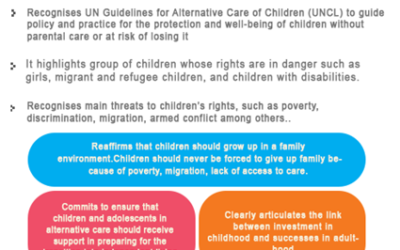
UN adopts Rights of the Child Resolution with a focus on children without parental care
UN General Assembly’s Third Committee finalized negotiations and adopted its annual resolution on the Rights of the Child (A/RES/74/21) on 18th November, 2019. This year, the resolution focuses on one of the world’s most vulnerable populations – children without parental care The Third Committee of the UN General Assembly embraces Rights of the Child resolution with advanced commitments for parentless and abandoned children across the world.
Highlights of the Resolution
Recognition of the circumstances undergone by children without parental care on daily bases.
Understands and expresses concern about threats to children’s rights, such as poverty, discrimination, migration and armed conflicts.
It highlights group of children whose rights are in danger. These includes girls, migrants, refugee children, and children with disabilities.
Reiterates that children should grow up in a family like environment for the full development of their personality.
Recognises the importance of measures to poverty reduction, prevention of violence, and support to families with disabilities by promoting positive parenting.
Commits to ensure that children and adolescent sin alternative care should receive support in preparing for the transition into independent living.
Achievements of the Resolution
This resolution has been intended to create a link between child care to upholding child rights, increases government accountability, a mandate to take action and translate increased financial resources.
It recognises that children without parental care are more vulnerable to experience violence, abuse, neglect, exploitation and exclusion.
Poverty should never be an excuse to separate children from their parents. A range of alternative options are needed.
Urges member states to take measure to support the children in transitioning from care into independent life approaching the issue holistically.
It stresses on key focus areas for the protection of the youth including continued education and training, access to housing, employment and psycho-social support.
Long term Achievements for SOS India
The resolution mainly emphasis on providing a range of alternative care options which will ultimately help SOS Children’s Villages of India to innovate our programmes and services.
This will help SOS India highlight the necessities of adolescents transitioning out of the care system. Recognises the importance of guidance, counselling, access to employment, education, training, psycho-social care and after care services.
It’s an opportunity to build on the need of the governments for knowledge and good practices on serving young people. We can offer experience from programmes such as YouthCan and YouthLinks.



